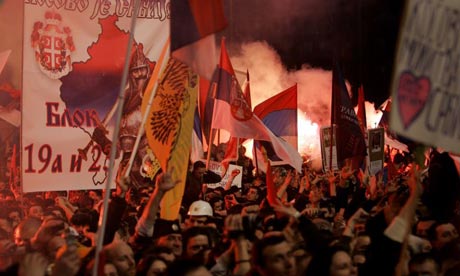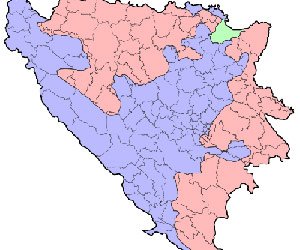AvarAllahNoor
IB Expert
- Messages
- 3,170
- Reaction score
- 257
- Gender
- Male
- Religion
- Sikhism
BELGRADE (AFP) — Violence flared on the Kosovo-Serbia border on Thursday, when several hundred former Serbian army reservists angered by Kosovo's independence attacked police with stones and burning tyres.
As Italy joined other major European powers in recognising Kosovo and Serbs poured into Belgrade for a rally to protest against the independence declaration, the group attacked around 100 Kosovo riot police at the southern Serbian border crossing point of Merdare.
Serbian police estimated around 300 reservists were involved in the assault.
The violence was the latest in a series of incidents that followed Sunday's unilateral declaration of independence from Serbia by Kosovo's ethnic Albanian-dominated parliament -- a move vehemently opposed by Belgrade.
Thick black plumes of smoke billowed from the border crossing and a NATO helicopter hovered overhead after the attack by the reservists, which lasted 20 minutes until they retreated.
The reservists, civilians who once served in the Serbian army, had crossed a Serbian checkpoint unhindered.
In another incident, a UN-run court was stoned overnight in the Serb-populated half of the tense northern Kosovo town of Mitrovica, police said.
On Tuesday, two other border crossing points at Banja and Jarinje were closed for 24 hours after they were ransacked and torched by at least 1,000 Serbs from Kosovo and Serbia.
The commander of the NATO-led Kosovo Force (KFOR), General Xavier Bout de Marnhac, said leaders of Kosovo's minority Serb community were responsible for the incident.
Hardline Kosovo Serb political leader Milan Ivanovic hit back, calling KFOR "a servant of US interests" and accusing foreign forces of turning "Kosovo into a concentration camp."
The border attack was the most violent reaction to the unilateral break by Kosovo and marked the first intervention by KFOR -- made up of 17,000 troops from more than 30 countries -- since the independence declaration.
Meanwhile, convoys of buses and trains ferried people to Belgrade for a "Kosovo is Serbia" protest in front of the old Yugoslav parliament, which was expected to draw hundreds of thousands demonstrators.
As Italy joined other major European powers in recognising Kosovo and Serbs poured into Belgrade for a rally to protest against the independence declaration, the group attacked around 100 Kosovo riot police at the southern Serbian border crossing point of Merdare.
Serbian police estimated around 300 reservists were involved in the assault.
The violence was the latest in a series of incidents that followed Sunday's unilateral declaration of independence from Serbia by Kosovo's ethnic Albanian-dominated parliament -- a move vehemently opposed by Belgrade.
Thick black plumes of smoke billowed from the border crossing and a NATO helicopter hovered overhead after the attack by the reservists, which lasted 20 minutes until they retreated.
The reservists, civilians who once served in the Serbian army, had crossed a Serbian checkpoint unhindered.
In another incident, a UN-run court was stoned overnight in the Serb-populated half of the tense northern Kosovo town of Mitrovica, police said.
On Tuesday, two other border crossing points at Banja and Jarinje were closed for 24 hours after they were ransacked and torched by at least 1,000 Serbs from Kosovo and Serbia.
The commander of the NATO-led Kosovo Force (KFOR), General Xavier Bout de Marnhac, said leaders of Kosovo's minority Serb community were responsible for the incident.
Hardline Kosovo Serb political leader Milan Ivanovic hit back, calling KFOR "a servant of US interests" and accusing foreign forces of turning "Kosovo into a concentration camp."
The border attack was the most violent reaction to the unilateral break by Kosovo and marked the first intervention by KFOR -- made up of 17,000 troops from more than 30 countries -- since the independence declaration.
Meanwhile, convoys of buses and trains ferried people to Belgrade for a "Kosovo is Serbia" protest in front of the old Yugoslav parliament, which was expected to draw hundreds of thousands demonstrators.


